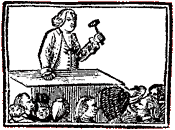Paging through the Town of Boston’s Tax Records
Yesterday the Boston Public Library announced that it had digitized Boston’s surviving tax records from 1780 to 1821, when the town officially became a city.
The first volume of “takings” or assessments, from 1780, was published a century ago by the Bostonian Society. The digital collection not only offers a look at the handwritten pages of that volume, but also adds the many more volumes created over the following decades.
Here as a sample are snapshots from one page of the 1780 volume. This section covers Ward 1 in the North End.
The next name, probably next to Broaders’s shop, was fellow barber Theodore Dehon. He was in his early forties at this time. Back in 1770 Dehon was established on State Street, and he was listed there again in the 1789 town directory. Dehon had another man living on his property in 1780, as well as journeyman Nicholas McMahon—who was “gone” a while later.
I’m convinced that the end of powdered-wig fashion caused a great constriction in the barbering business. Broaders ended up opening a “slop shop” selling clothes to sailors before going mad. Another former barber’s apprentice, Ebenezer Fox, likewise left the profession and opened a shop in Roxbury.
Here’s another person with a Massacre link: David Bradlee, who helped carry away Crispus Attucks’s body. Trained as a tailor, he became a Massachusetts artillery officer during the war and invested in a successful privateering voyage. In 1780 he was running a substantial tavern. That led him into the business of importing wine, thus rising from mechanic to merchant.
The last name above is Col. Isaac Sears, a Massachusetts native who had made his name and fortune in New York City. He was a leader of the Whigs there before the war and basically controlled the city in late 1775. When the British military returned, Sears moved to Boston and engaged in privateering and trading.
The next scrap shows Benjamin Cudworth, one of the town’s tax collectors. It’s notable that he owned considerably less real estate that Gawen Brown, the maker of the Old South Meeting-House clock.
The library’s research guide to the collection explains some of the quirks of these documents.




